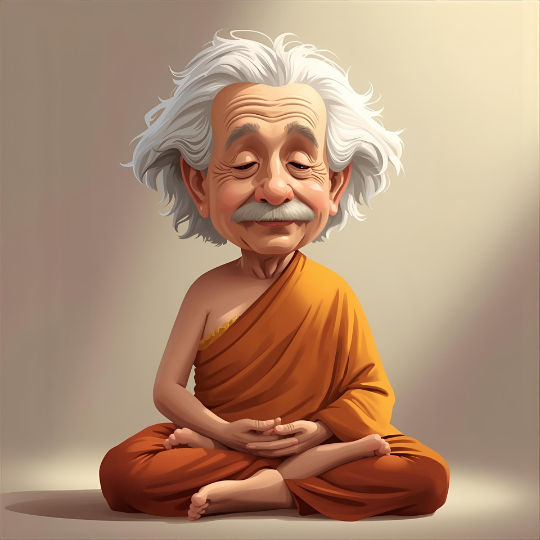Understanding Belief and Atheism in the Spiritual Realm
Introduction: Understanding Belief and Atheism in the Spiritual Realm
In an era where science and spirituality often find themselves in dialogue, or even conflict, exploring atheism from a spiritual perspective offers new perspectives. This article examines the role of belief in shaping our understanding of reality and highlights its importance, not only in religion, but also in everyday life. Belief is fundamental, whether in matters of magic, relationships, or the search for meaning in life, and even atheism is not immune to its grip. By understanding how belief functions within a spiritual framework, we can see it as a tool for empowerment, rather than a flaw or weakness.
Atheism: A Challenge to Belief Systems
Atheism is traditionally based on skepticism about religious belief and, more broadly, about any idea lacking empirical evidence. Atheists often dismiss spiritual doctrines or practices as superstitions or irrationalities, arguing that they are not supported by scientific evidence. Yet this philosophy also requires a form of belief—one that relies on materialism and measurable evidence as the only bases of truth.
Although atheism seeks proof of the divine, this notion of "proof" itself depends on the belief of the one seeking proof. Proof is only meaningful when we accept or believe in its validity. Thus, atheism may challenge the beliefs of others, but operates on a subtle belief system of its own. This stance can lead, according to spiritualists, to an incomplete view of reality, one that ignores the inner dimensions of existence and denies the invisible but powerful forces at work in the universe.
Belief as the Foundation of Spiritual Growth and Magic
In the spiritualityBelief is not passive; it is a dynamic force that catalyzes transformation. Every step of spiritual practice, from meditation to ritual, relies on the practitioner's belief in its efficacy. Belief is more than just mental attunement; it is an active, conscious alignment with the energies of the universe. In fact, belief is essential for manifesting intentions, a fundamental concept in spiritual practices like magic and alchemy.
Belief is often seen as the starting point, but spiritual growth deepens as one evolves in faith, a commitment that transcends doubt and is strengthened by practice and experience. Faith then leads to realization, the final phase where belief is fully realized in tangible form. This process is visible in the practice of magic, where belief is not blind, but a concentrated energy that practitioners channel to create desired results. Without belief, there is no magic; without faith, rituals remain mere gestures. This sequence of belief, faith, and realization is not a limitation, but a path to powerful spiritual power.
Religion, Mysticism and the Deep Wisdom They Offer
Religions and spiritual systems often contain profound wisdom about the human experience. Beyond belief, these systems are full of mysteries, symbolic language, and coded teachings that connect us to the sacred order of the universe. Religious texts, such as the Bible, the Quran, and Egyptian or Native American scriptures, offer different forms of wisdom that can be unlocked through interpretation. By exploring these texts, practitioners discover three distinct layers: history (the exoteric aspect of religion, known to the general public), collective consciousness (our story), and mystery (my story), which represents the esoteric part of religion, unknown to the general public. These layers together weave a rich array of insights, offering guidance and a solid foundation when interpreted correctly, with the necessary level of knowledge.
For example, history tells us about events that shaped humanity, while mysteries open the door to universal truths and deep, hidden knowledge. Through these texts, practitioners understand their place in the cosmos and connect with the collective consciousness of all beings. Religious doctrine, therefore, contains much more than simple faith; it encapsulates the evolution of human understanding, our interaction with the divine, and the wisdom of those who came before us.
Spiritual Intelligence and the Invisible Realm
Spiritual intelligence requires both an understanding of the physical world and an acknowledgment of unseen forces. People with spiritual intelligence do not deny the existence of higher energies; they work with these energies to co-create reality. In this approach, belief functions as a bridge between the material and the metaphysical, allowing individuals to influence outcomes through ritual, intention, and the power of thought.
Magic, for example, relies on the ability to believe in and interact with forces beyond the visible world. Working with entities, deities, or guardian spirits involves understanding that these energies respond to belief and offerings. Rituals, therefore, are not simply symbolic acts; they are means of invoking and directing invisible energies. This relationship with the invisible highlights that belief is not an obstacle to knowledge, but rather a tool that helps access higher realms and foster transformation.
The Spiritual Perspective on the Origin of the Universe and the Big Bang Theory
Atheists often espouse theories such as the Big Bang, suggesting that the universe was created by an initial explosion or cosmic accident. However, from a spiritual perspective, the creation of the universe is seen as part of a cycle, not a random event. The Big Bang is seen as one of many cosmic cycles, with creation, expansion, and eventual transformation into other forms. Spiritual wisdom teaches that the universe is self-correcting, meaning that all events, even destructive ones, serve a higher purpose within this cycle.
Unlike the random coincidence suggested by the Big Bang, spiritual teachings affirm that everything is interconnected. The universal order is perfect, without accidents. This divine intelligence can be compared to a cosmic algorithm, where cycles of creation and destruction maintain balance. Understanding the universe as a cycle helps practitioners align with its rhythm, recognizing that destruction paves the way for new beginnings and that we, too, are part of this cosmic dance.
The Middle Way: Integrating Belief and Evidence into Spiritual Practice
Atheists often emphasize facts and material evidence, while spiritual practitioners embrace a belief in unseen forces. However, these two perspectives are not necessarily in opposition. Integrating belief and evidence can offer a more complete understanding of reality. Spiritual practices such as astrology, meditation, or rituals may be based on belief, but they also rely on empirical observation and experiential knowledge. Astrology, for example, uses planetary patterns documented over the centuries to interpret personal and collective cycles.
This middle path allows belief to be informed by experience and evidence. By combining belief with firsthand observation, spiritual practitioners can validate their experiences, moving beyond blind faith to a realm of proven knowledge. This approach does not negate the importance of belief, but rather strengthens it through a process of self-discovery and self-realization.
Belief in Practice: How Faith Strengthens the Spiritual Path
In any pursuit—whether personal goals, relationships, or spiritual journeys—belief is essential. For example, relationships rely on a belief in a partner's integrity, just as personal aspirations require a belief in one's own abilities. Atheism's rejection of belief ignores its role in empowering individuals, reducing it to superstition instead of recognizing it as a driver of creativity, courage, and growth.
Spirituality (not to be confused with religion) invites individuals to embrace belief as an active force, whether it is trusting one's higher self, engaging with deities, or tapping into universal energies. This belief nurtures an unwavering confidence, helping practitioners overcome life's challenges. When combined with inner work, belief becomes more than just hope; it becomes the foundation upon which personal transformation is built.
Conclusion: Embracing Belief as a Tool for Connection and Creation
Belief is not a limitation; it is a gateway to self-discovery and spiritual connection. By recognizing the power of belief, we can begin to see it as a valuable tool for exploring the mysteries of reality. Atheism's critique of belief often overlooks the value of inner wisdom, rejecting a rich dimension of experience. Spirituality, on the other hand, celebrates belief as the cornerstone of transformation, enabling individuals to access higher planes of consciousness.
This integration of belief and fact offers a balanced approach to life's questions, fostering a spirit of curiosity and reverence for the unseen. Rather than viewing belief as a weakness, we should celebrate it as a way to connect with the universal intelligence that permeates all things. In this way, belief becomes not only an act of faith, but a powerful path to self-realization and cosmic understanding.

